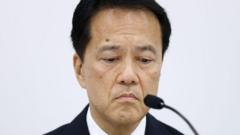Nomura's top executive, Kentaro Okuda, is cutting his pay by 30% for three months after a recent scandal where a former banker was charged with robbery, attempted murder, and arson relating to bank clients.
Nomura CEO Takes 30% Pay Cut Following Shocking Client Incident

Nomura CEO Takes 30% Pay Cut Following Shocking Client Incident
In response to a severe incident involving a former employee, Nomura's CEO has announced a temporary reduction in salary as the bank takes measures to regain client trust.
Nomura Holdings has recently faced a scandal that has shaken client confidence, leading to serious repercussions for executive leadership. The CEO, Kentaro Okuda, has voluntarily agreed to a short-term salary cut of 30%, following allegations against a former employee involved in a violent crime spree against clients.
On July 28, the ex-employee allegedly stole from clients and subsequently set fire to their home, causing alarm and distress. Following this incident, he was dismissed on August 4 and later arrested in October. The bank has since apologized to the victims directly affected by the incident, expressing its heartfelt regret.
In a statement, the bank detailed that nine other senior executives will also be compelled to return between 20% to 30% of their salaries for three months in solidarity with those impacted. "We take this matter very seriously," Nomura declared, emphasizing the need for rigorous safety protocols given the trust clients place in financial institutions.
Authorities uncovered the former employee's misconduct after he revealed to colleagues that he was under police scrutiny for his actions. The bank acted swiftly, launching an internal investigation and ensuring client safety through proactive communication and outreach.
Moving forward, Nomura has committed to implementing enhanced security measures for client interactions, including mandatory oversight during client visits and telephone correspondence, as well as enforcing regular leave for employees aimed at identifying any irregular behaviors.
As one of Japan's largest banks with operations in around 30 countries, Nomura plays a pivotal role in wealth management and investment banking. The company's current scandal highlights the critical importance of maintaining client trust and the severe implications of employee misconduct on reputational integrity.
On July 28, the ex-employee allegedly stole from clients and subsequently set fire to their home, causing alarm and distress. Following this incident, he was dismissed on August 4 and later arrested in October. The bank has since apologized to the victims directly affected by the incident, expressing its heartfelt regret.
In a statement, the bank detailed that nine other senior executives will also be compelled to return between 20% to 30% of their salaries for three months in solidarity with those impacted. "We take this matter very seriously," Nomura declared, emphasizing the need for rigorous safety protocols given the trust clients place in financial institutions.
Authorities uncovered the former employee's misconduct after he revealed to colleagues that he was under police scrutiny for his actions. The bank acted swiftly, launching an internal investigation and ensuring client safety through proactive communication and outreach.
Moving forward, Nomura has committed to implementing enhanced security measures for client interactions, including mandatory oversight during client visits and telephone correspondence, as well as enforcing regular leave for employees aimed at identifying any irregular behaviors.
As one of Japan's largest banks with operations in around 30 countries, Nomura plays a pivotal role in wealth management and investment banking. The company's current scandal highlights the critical importance of maintaining client trust and the severe implications of employee misconduct on reputational integrity.





















